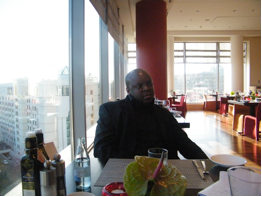
“It was obviously made by, you know, a gay, because its just beautifully made with attention to detail. Even the buttons are covered!”
Wendy is telling the story of how she just found the cutest little jacket for her dog, Onion, at the Charity Shop, after she’d taken him to the parlor for a “little pedi”.
Wendy is proud of her savvy. She can skillfully combine
luxuries with unashamed visits to the local charity store, which she also sees as supporting a good cause, while saving money.
“Your generation doesn’t know how to find a deal. We never pay more than R30 for a bottle of wine. Although of course we buy a few cases at a time… you know…”

Wendy and her friends aren’t negatively affected by the recession. In fact, they have been able to take advantage of the current state of affairs by investing in cheap shares, taking advantage of holiday deals overseas and by ‘switching’ holiday homes with Europeans.
“The recession has done wonders for my business. I own four Montessori schools and because a lot of woman are going back to work we have had a 30%
increase in enrollment this year.”
“We have had some wonderful opportunities by switching our barge in France with Europeans who have houses all over the world. We had a lovely skiing holiday in Austria, we stayed in a country manor in England and we had a holiday by the sea in Australia. All without paying for accommodation.”
Whilst Mike is less flashy than Wendy and her friends, he too,

has seen the recession as a positive. A way to filter out the bad, and make way for the new. In fact, Mike refers to the recession, as “nothing more than the common cold”. His life as he knows it, has not stopped. He is not hospitalized or re-evaluating his will. He has by no means been reckless enough to have the “cold” morph into something like “pneumonia”.
And, he and his management team seem to have benefited from the recession.
“Having recently completed a management buy-out, the recession helped us filter out any unnecessary spending. The limping-antelope-divisions were sacrificed so that the stronger herd could remain. Our timing was perfect. We knew high-risk before we were really tested by it. We’ve been cost-cutting cautious, which made us welcome the recession. We were ready to take it on.”

This market knows that success does not come easily – “you have to be proactive and work hard”, says Tony, the CEO of an IT company and self-made billionaire, “the world is not there to pay me any favors, and the recession can try to steal my worth, I will just have to work harder to outsmart it”.
Unlike the BEE market in South Africa, they don’t believe in quick fixes and pots of gold at the end of the rainbow. They are realists. Their ethos is rooted in their experiences of having lived through the likes of petrol rations, water restrictions as well as interest rates of 20%. They are the children of the parents who lived through the Great Depression. They know they have to be smart. Perhaps it’s about rewarding their “deal-finding” abilities with certain luxuries that they may find guilty purchasing otherwise? Perhaps, this is the generation that grew up, where reward was given for hard work, not easy gaps and quick fixes.
Opportunity: Give Them Deals That Make Sense. Not Too-Good-To-Be-Trues.
- Adene
























